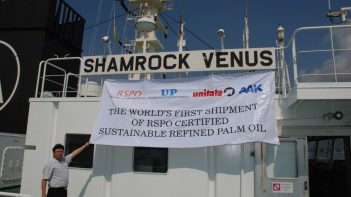English | Bahasa Indonesia | Français | Español
On 7 November 2012 – Yves Daudigny, member of the Social Affairs Commission of the French Senate, tabled an amendment on the Draft Finance Law for Social Security for 2013 (PLFSS) to increase taxes on palm oil. While the proposed amendment refers to health-related concerns on palm oil consumption, the considerations in the public domain have also raised important questions on the environmental impact of palm oil production.
As a world-wide multi stakeholder organization and international certification scheme for sustainable palm oil, the Roundtable for Sustainable Palm Oil (RSPO) intends to comment on the environmental aspects of the palm oil discussion which is taking place in France, partly in connection with and partly independent from the recent development on the proposed palm oil tax increase in France.
With the escalating global demand for vegetable oil due to population increase and growing affluence (particularly in India and China), palm oil remains the most popular choice to meet this demand, due to its high versatility for a broad range of applications. Palm oil is the most widely produced vegetable oil, is one of the most inexpensive oils, with the highest yield per hectare.
Concerns surrounding environmental destruction (deforestation and wildlife conservation) are not exclusive to palm oil but are prevalent across the board with the cultivation of any type of monoculture crop. Any proposition to decrease the use and demand of palm oil, based on environmental concerns, will not effectively address such concerns. The demand would merely shift to other vegetable oils, which will not only maintain but are likely to increase the adverse environmental impact of vegetable oil production, since the alternative crops require 4 to 10 times more land for the same amount of output compared to palm oil.
In order to address the environmental concerns surrounding the production of palm oil, in 2005 RSPO established a certification standard based on a set of Principles and Criteria which ensure that primary forests, high conservation value areas and endangered wildlife species are protected. The certification process is audited by independent Certification Bodies which must be accredited by a third party accreditation body.
The RSPO standard has been globally accepted in major palm oil producing countries around the world, including Indonesia, Malaysia, Papua New Guinea, Solomon Islands, Latin America, West Africa and Cambodia. To date, approximately 14% of crude palm oil produced globally is RSPO certified. RSPO members’ annual production capacity stands at more than 7 million metric tons over 1.6 million hectares of certified area.
In June 2011 RSPO launched its Trademark for consumer goods products. Within just over a year, 72 licensees have been granted across 14 countries including France. The RSPO Trademark offers a wellinformed choice for consumers who can now identify and differentiate products which use RSPOcertified sustainable palm oil.
The European Union and France have a prominent role to play in supporting the production and use of sustainable palm oil so that growers from developing nations continue to be motivated to produce according to RSPO’s sustainability standards. In addition, a consistent demand for sustainable commodities from European consumer markets will allow growers’ communities to sustain their livelihoods.
Already a significant number of RSPO member companies in Europe, including well-known organizations in France, have committed towards supporting the procurement of certified sustainable palm oil. Their achievements have been communicated through the Annual Communications of Progress Reports published by the RSPO.
The RSPO calls on European industries and consumers to take a firm lead on the transition towards a more sustainable production and consumption path, by opting for certified sustainable palm oil.
—END—
For further information, kindly contact:
Contact for RSPO Secretariat:
Anne Gabriel, Communications Director | T: 603 – 2201 2053 | [email protected]
Contact for Europe:
Giovanni Colombo, Hill+Knowlton Strategies | T: +32 (0)2 231 50 19 | [email protected]
Keep reading

RSPO hosts first Africa downstream sustainable palm oil supply chain forum in Cape Town

Nearly two decades on, Europe continues to drive global demand for RSPO Certified Palm Oil

Communicating Sustainable Palm Oil - examples of success across Europe
[EOT] Terms of Reference: Independent Smallholders Outreach Programme in Indonesia

RT2023 Delegates Propose Solutions to Reinforce RSPO’s Assurance System – End-Year Highlights of Assurance Standing Committee
RSPO UK Members' Day Examines Shifting Dynamics of Doing Business within Europe

Celebrating 20 Years of RSPO’s Sustainability Journey




